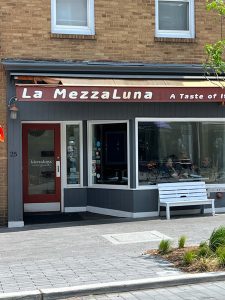 Would you like to be able to go into all your favorite local restaurants and order an alcoholic drink to go with your meal? Or perhaps have some food along with your favorite local craft brew? Changes are underway to allow both to happen in NJ.
Would you like to be able to go into all your favorite local restaurants and order an alcoholic drink to go with your meal? Or perhaps have some food along with your favorite local craft brew? Changes are underway to allow both to happen in NJ.
On Monday, the craft beverage industry saw a major advancement as two NJ Senate Committees approved legislation that would allow craft alcoholic beverage manufacturers to have food and events on site. It’s a big step forward from the strict guidelines they have been operating under for years. It’s also an expansion that many bar and restaurant owners, who pay a premium for consumption liquor licenses, were weary of.
“They argue that a craft brewer who paid just a few thousand for a craft brewing license should be severely restricted as to what they can or cannot do. The ABC (Alcoholic Beverage Control) restrictions on craft breweries restricting the number of special events, the types of activities allowed and the ability to serve most types of food have caused quite a bit of hardship to the small breweries in NJ,” shares Princeton resident Dennis Scheil, who finds the restrictions on craft breweries have been stifling.
As the bill works its way to the Senate floor, there is anticipation it might get passed before the budget is signed at the end of the month and summer recess begins.
The push against expanding the right for craft breweries has been strong, in part, because establishments with consumption liquor licenses in NJ do not want to see their investments undercut. Such licenses often stay with an entity for its lifetime. They can be sold and transferred within a town, but not across municipal borders. Due to their limited availability, these NJ liquor licenses have recently sold for well over $1million.
 “I suppose reform is a good idea, over a million and a half dollars for a license makes no sense,” shares Raoul Momo, co-owner of Terra Momo Group. He and his family had the foresight and were lucky to purchase licenses for their restaurants, like Mediterra and Teresa Caffe in Princeton. “Both were purchased over 20 years ago. Like any appreciable asset, it has gone up in value, like real estate, 5X the price of what we paid. But it was a lot back then!”
“I suppose reform is a good idea, over a million and a half dollars for a license makes no sense,” shares Raoul Momo, co-owner of Terra Momo Group. He and his family had the foresight and were lucky to purchase licenses for their restaurants, like Mediterra and Teresa Caffe in Princeton. “Both were purchased over 20 years ago. Like any appreciable asset, it has gone up in value, like real estate, 5X the price of what we paid. But it was a lot back then!”
In Princeton, there are those restaurants with consumption licenses, allowing them to serve alcohol, as well as one that includes a restricted brewery for Triumph Brewing Company (under construction at its new Palmer Square location). New Jersey Law dictates how many consumption licenses are allowed per municipality, allowing one for every 3,000 residents. In today’s Princeton, however, there are slightly more than that, since licenses were once purchases under both Princeton Township and Princeton Borough. There is a tight handle on who has a license, since they are hard to come by and seldom change hands, but that could be a thing of the past. In this year’s State of the State address, Governor Phil Murphy announced his intent to overhaul the laws many describe as archaic and limiting. For years there have been varying versions of bills in both the Senate and Assembly to loosen laws, including efforts to expand the opportunities for establishments to get a license. The most recent versions, which also expand the capacity for breweries and wineries to sell and distribute, were introduced in late February and are still sitting in committee.
 The laws that exist today were created post-prohibition to prevent a monopoly in the industry, thus defining manufacturers, wholesalers, retailers, etc. by category and assigning them the appropriate license to operate. Triumph Brewing Company is the only Princeton establishment that seeks to be affected by both the laws that loosen restrictions on consumption licenses and laws that broaden capabilities of small batch breweries. To open his brewpub (which he describes as a restaurant with a brewery inside it), founder, brewer and owner Adam Rechnitz, worked to change the laws. In 1993, Triumph was able to acquire a license as a restricted brewer with the caveat that it also purchase a consumption liquor license to operate the full restaurant and bar that makes it so unique. Rechnitz understands the concerns people are raising but says as long as the state makes current license holders whole through some form of tax break or something, he would concede to the changes on the table.
The laws that exist today were created post-prohibition to prevent a monopoly in the industry, thus defining manufacturers, wholesalers, retailers, etc. by category and assigning them the appropriate license to operate. Triumph Brewing Company is the only Princeton establishment that seeks to be affected by both the laws that loosen restrictions on consumption licenses and laws that broaden capabilities of small batch breweries. To open his brewpub (which he describes as a restaurant with a brewery inside it), founder, brewer and owner Adam Rechnitz, worked to change the laws. In 1993, Triumph was able to acquire a license as a restricted brewer with the caveat that it also purchase a consumption liquor license to operate the full restaurant and bar that makes it so unique. Rechnitz understands the concerns people are raising but says as long as the state makes current license holders whole through some form of tax break or something, he would concede to the changes on the table.
“I would want restricted and limited brewing licenses to fall under one license, so it is equitable all around,” Rechnitz shares. “I also would be delighted if the state did away with the archaic limitations on the number of consumption licenses allowed. The market will determine the cap that can succeed.”
 On Monday night, Princeton Council voted through a Consent Agenda to renew 14 of the town’s alcoholic beverage consumption licenses for the coming year (other restaurants, like The Meeting House, have until June 30th to submit for renewal). There was nothing new or shocking in this resolution, as these establishments paid for this right and are generally renewed annually without event. But it is significant this year, because if the law changes to offer more and drastically cheaper licenses, this could be the last year the list will remain the same. New laws could loosen the limits by 10% annually, allowing one license per 2,700 residents for 2024, with one for every 2,430 in 2025 and continuing in this vein until limits are eliminated by 2029.
On Monday night, Princeton Council voted through a Consent Agenda to renew 14 of the town’s alcoholic beverage consumption licenses for the coming year (other restaurants, like The Meeting House, have until June 30th to submit for renewal). There was nothing new or shocking in this resolution, as these establishments paid for this right and are generally renewed annually without event. But it is significant this year, because if the law changes to offer more and drastically cheaper licenses, this could be the last year the list will remain the same. New laws could loosen the limits by 10% annually, allowing one license per 2,700 residents for 2024, with one for every 2,430 in 2025 and continuing in this vein until limits are eliminated by 2029.
“The Governor’s proposal floods the system, and it will be like seeing taxi medallion values erode in New York City, thanks to Uber. Good for the big tech, bad for the small guy (that’s us!),” Momo expresses.
Are there options that would help previously purchased consumption licenses retain value while opening the door for expansion? Michele Moriello, owner of La Mezzaluna on Witherspoon Street, would support a compromise.
 “One way could be to create a license only for basic wines and beers and leave the exclusivity of the most valuable liqueurs, cocktails and wines to those who own the other licenses,” shares Moriello, whose establishment is currently bring your own booze (BYOB). “It would be a fair and deserved chance. BYOB restaurants survive on the margin that there is on food and with prices that continue to have upward changes it has become more difficult to make the right reward for the risk a restaurateur takes.”
“One way could be to create a license only for basic wines and beers and leave the exclusivity of the most valuable liqueurs, cocktails and wines to those who own the other licenses,” shares Moriello, whose establishment is currently bring your own booze (BYOB). “It would be a fair and deserved chance. BYOB restaurants survive on the margin that there is on food and with prices that continue to have upward changes it has become more difficult to make the right reward for the risk a restaurateur takes.”
If they offer it, will customers endorse the change? A Princeton Perspectives survey of 50 Princeton locals showed that 63% want to see more restaurants in Princeton (and beyond) with the ability to serve. It’s time to update the laws, some say, while others contend the option to have a cocktail with dinner is very enticing.
“Levels the playing field,” explains Princeton local Terri Pessutti. “Makes it easier to have just one drink because you are not toting an entire bottle of wine when dining out. And it helps to increase revenue options for eating establishments.”
The increased revenue is one of the major arguments for licensing changes, as the markup on alcohol is exponentially higher than that of food. This could mean make-or-break for small business entrepreneurs. A strong advocate for local businesses, Councilwoman Michelle Pirone Lambros has been speaking out for reform for many years. She has met with sponsors of legislation and other state representatives and participated in a variety of forums on the topic, including those held by the Downtown NJ and NJ League of Municipalities. The increased opportunity and revenue, she feels, will also help attract more restaurants to town.
 “Just the addition of allowing wine and beer only licenses would have a positive impact both on attraction and creation of more small restaurant businesses, as well as helping those existing businesses have an additional revenue stream. For some restaurants, it could be a lifeline for helping them expand their profitability,” Pirone Lambros states. “Another compelling reason is that employees being paid on minimum wage plus tips would see an increase in their paychecks, creating a higher standard of living wage. Liquor license reform is an equity issue for both the employers, which would particularly help small businesses, as well as employees.”
“Just the addition of allowing wine and beer only licenses would have a positive impact both on attraction and creation of more small restaurant businesses, as well as helping those existing businesses have an additional revenue stream. For some restaurants, it could be a lifeline for helping them expand their profitability,” Pirone Lambros states. “Another compelling reason is that employees being paid on minimum wage plus tips would see an increase in their paychecks, creating a higher standard of living wage. Liquor license reform is an equity issue for both the employers, which would particularly help small businesses, as well as employees.”
There is a desire by Pirone Lambros to see more full-service restaurants. Current restaurant owners also support progress, if it’s not a free-for-all.
“The system can be preserved to protect the industry and not let chains flood the market,” Momo details. “We have a great diverse number of quality-independently owned establishments like ours that will suffer from chain competition. Imagine 3 new bars and restaurants at the Princeton Shopping Center. Pretty sure the town does not need that. But one, yes, like the old Main Street Bistro.”
 One thing was clear through our survey, and that is that locals like choice. Whether the choice to walk into a restaurant and choose their drink, or to bring one along with them. Nearly 37% of those that responded truly value the latter. They say it ensures they are drinking what they like, can control the cost of their outing and allows for a choice of ambience. They are happy with the balance that currently exists.
One thing was clear through our survey, and that is that locals like choice. Whether the choice to walk into a restaurant and choose their drink, or to bring one along with them. Nearly 37% of those that responded truly value the latter. They say it ensures they are drinking what they like, can control the cost of their outing and allows for a choice of ambience. They are happy with the balance that currently exists.
“Small college town, already has enough offerings. In addition, BYOB is a very nice option,” explains resident JoanMarie Land Zetterberg.
Should the law change for next year, BYOB restaurants will still be around for at least a while. There will still be only a limited number of additional licenses each year and it is still possible not every establishment will want to add that to their offerings. Committees for both the Assembly and Senate have work to do to advance the possibility of new legislation for consumption liquor licenses. But, for craft beverages, the lifting of restrictions may be more eminent. If it is reported out of committee and put on the board, the Senate could vote at its next session on June 20th. If approved, it would go to the Assembly for a vote and then possibly to Governor Murphy for his signature.

Lisa Jacknow spent years working in national and local news in and around New York City before moving to Princeton. Working as both a TV producer and news reporter, Lisa came to this area to focus on the local news of Mercer County at WZBN-TV. In recent years, she got immersed in the Princeton community by serving leadership roles at local schools in addition to volunteering for other local non-profits. In her free time, Lisa loves to spend time with her family, play tennis, sing and play the piano. A graduate of the S. I. Newhouse School of Public Communications at Syracuse University, Lisa was raised just north of Boston, Massachusetts but has lived in the tri-state area since college. She is excited to be Editor and head writer for Princeton Perspectives!
